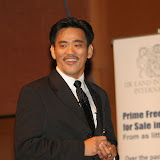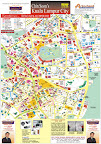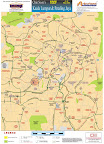i-Property:The Best and the Worst – All in 2011
Gavin Tee, a property investment consultant who has a huge following among the Chinese community in Malaysia gazes at the crystal ball and gives his RM2K worth of opinion. Gavin is also the President and founder of Swhengtee International Real Estate Investors Club, a fast-growing property investment club.
“The real estate market had gone through a roller coaster ride in recent years, from a soaring market in 2008 to a depressed market in 2009 and skyrocketing again this year! With all the ups and downs in such a short period, what should we expect in 2011?

There will be a very special phenomenon in 2011 because the best and the worst opportunities in the real estate market will emerge. The implementation of a maximum loan-to-value (LTV) ratio of 70% will affect the investing movements in the housing market, while the Prime Minister Datuk Seri Najib Tun Razak’s Economic Transformation Programme (ETP) will create new prospects and opportunities in the real estate market.
The targeted implementation of the LTV ratio is expected to moderate the excessive investment and speculative activity in the residential property market which has resulted in higher than average price increases. The main objective of this policy is to encourage home ownership, according to the government. On the other hand, this policy will not help to curb speculation! Instead, it will jeopardize the real estate market and dampen the national economy!
Property prices are still relatively low and transaction activities are stifled. For example: Many owners of high-end apartments and second-tier urban houses are facing difficulties at selling their properties and the 70% mortgage cap simply made the situation worse.
In the secondary market, many houses are presently facing financing problems. The 70% mortgage cap will cause further difficulties to them in disposing the properties. Even some of the “hottest” properties in the market are affected by this policy. As the economy has not fully recovered from depression, this measure will cause a double blow to the real estate market.
On the other hand, the development plans that Prime Minister Najib announced earlier in the Budget 2011 will spur the real estate market, especially in globalized areas where economic activities are most active. Investors must be aware of the strategic plans announced by government as the real estate market in Malaysia will move forward with globalization.
The Greater Kuala Lumpur project will create a strong impact for the country. Strategic urban planning and development will not only enhance Malaysia’s image internationally, but also promote the development of the surrounding cities and towns. For example: the construction of the 100-storey Warisan Merdeka will attract large numbers of local and foreign investors to invest in our country as this iconic office cum commercial building will create an international identity for Malaysia in this globalized era.
Looking into the future, the market will continue to flourish next year. Even though the market had gone through major changes in the past few years, the best and the worst deals will occur in 2011. Commercial property with special design concepts, office buildings, green buildings, as well as commercial properties related to the tourism industry have high potential next year.
Besides, the real estate market is estimated to continue growing next year. Taking medium cost property as an example, the price of such properties near urban areas has not increased very much for the past 15 years. Even though new properties launched in these areas have increased their prices by 20% to 30%, it does not signify a bubble in the real estate market. The overall housing prices are still considered relatively low at the moment and have plenty of room for growth.
However, there seems to be a very unhealthy trend in the real estate market this year as many investors rushed to purchase new projects even though the selling price is comparatively high. This has resulted in pockets of bubbles in certain areas. Some of these projects do not have high potential for investment. These investors might face difficulties in renting or disposing their property next year. I advise investors to dispose off any such properties even with low capital appreciation.
Innovation and interesting concepts are the factors causing new buildings to sell at higher prices compared to old buildings. However, smart investors should not just look for new properties but also old ones as the prices are much lower and investors can renovate the building with new concepts.
In a nutshell, I believe that properties with great potential at low prices are available everywhere. However, investors must do their homework and search for the best opportunities that come along.”



 1:53 AM
1:53 AM
 水兴浪 Gavin Tee
, Posted in
水兴浪 Gavin Tee
, Posted in















